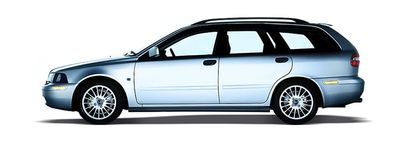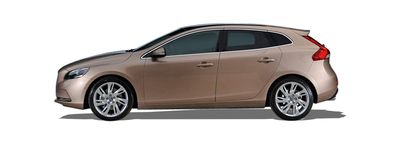Table of Contents
Volvo V40 Estate Engines
Since its launch in 1995, the Volvo V40 Estate has established itself as a compact family estate with Swedish engineering expertise and offers a diverse range of engines over two generations, from economical diesels to powerful turbocharged petrol engines. The technological evolution has ranged from classic naturally aspirated engines of the first generation to modern Drive-E units with advanced turbocharging and direct injection.

Volvo V40 Estate Generation I (1995-2004)

The first Volvo V40 estate generation was characterized by robust Swedish engineering and featured exceptionally durable engines that easily reached 400,000 to 500,000 kilometers with proper maintenance. Major repairs were typically only due after 200,000 to 300,000 kilometers, mainly on auxiliary units such as the water pump or alternator. The absolute top engine of this generation was the 2.0-liter turbocharged petrol engine with 160 hp, which perfectly combined power and reliability and became the trademark of the series. Technically, all Volvo V40 estate engines were based on proven designs with cast-iron engine blocks and robust valve trains, which explains their exceptional longevity. In a market comparison with German competitors such as the VW Golf Variant or Audi A4 Avant, the Volvo V40 Estate scored points above all for its reliability and excellent price-performance ratio.
Volvo V40 Estate petrol engines: Generation I (1995-2004)
The Volvo V40 Estate petrol engine range initially comprised the 1.6-liter naturally aspirated engine with 105 hp, which served as the entry-level engine and was characterized by low fuel consumption and high reliability. The 1.8-liter engine with 115 hp offered more pulling power for everyday family life, while the top version with a 2.0-liter naturally aspirated engine produced 140 hp. The highlight, however, was the 2.0-liter turbo engine with 160 hp, which gave the Volvo V40 station wagon sporty driving performance. All Volvo V40 Estate petrol engines were based on Volvo's proven Modular Engine family and were considered virtually indestructible. Typical weak points were only the ignition coils after high mileage and occasional problems with the crankshaft oil seal. The 1.8-liter engine developed into the most reliable unit of the entire series.
Volvo V40 estate diesel engines: Generation I (1995-2004)
A 1.9-liter turbodiesel with 90 hp was initially used in the Volvo V40 estate diesels, which was later supplemented by a more powerful 115 hp version. These Volvo V40 Estate TDI engines came from the cooperation with Volkswagen and were based on the proven 1.9 TDI unit. The Volvo V40 Estate 1.9 TDI with 115 hp proved to be particularly economical with an average consumption of just 5.2 liters per 100 kilometers. Typical problems concerned the injection pump after very high mileages and occasional defects in the turbocharger. However, the diesel engines were considered to be very durable and often reached a mileage of over 500,000 kilometers.
| Volvo V40 estate engine | Power output | Fuel consumption | Typical weaknesses | Rating |
|---|---|---|---|---|
| 1.6 petrol engine | 105 HP | 7.2 l/100km | Ignition coils, crankshaft seal | Very good |
| 1.8 petrol engine | 115 HP | 7.8 l/100km | Very robust, hardly any problems | Very good |
| 2.0 petrol engine | 140 HP | 8.4 l/100km | Crankshaft seal | Good |
| 2.0 Turbo | 160 HP | 8.9 l/100km | Turbocharger after high mileage | Good |
| 1.9 TDI | 90-115 HP | 5.2-5.8 l/100km | Injection pump, turbocharger | Very good |

Volvo V40 Estate Generation II (2012-2019)

The second Volvo V40 estate generation marked a completely new beginning with modern Drive-E technology and typically reached 250,000 to 350,000 kilometers with proper maintenance. Major repairs were usually due between 150,000 and 200,000 kilometers, mainly on the more complex electronics and turbochargers. The absolute highlight was the T5 with 254 hp, which combined sporty performance with acceptable reliability. Technically, the new Drive-E engines revolutionized the series with direct injection, variable valve control and modern turbochargers, but this also led to greater complexity. Compared to competitors such as the BMW 1 Series or Audi A3 Sportback, the Volvo V40 Estate continued to offer an excellent level of safety, but struggled with the increased complexity of modern engine technology.
Volvo V40 Estate petrol engines: Generation II (2012-2019)
The second generation Volvo V40 Estate petrol engine range was based entirely on Drive-E technology. The entry-level T2 engine with 1.5-liter displacement and 122 hp offered economical drive for city traffic. The T3 with a 1.5-liter engine and 152 hp represented the ideal compromise between performance and consumption. For sporty drivers, there was the T4 with a 2.0-liter engine and 190 hp and the top-of-the-range T5 engine with 254 hp. All Volvo V40 estate engines had direct injection and turbocharging. The T3 engine developed into the most reliable unit of this generation, while the powerful T4 and T5 variants occasionally experienced problems with turbocharger damage and high-pressure pumps. Typical weak points of all Drive-E engines were the timing chain after high mileage and coking of the intake valves due to direct injection.
Volvo V40 estate diesel engines: Generation II (2012-2019)
Only 2.0-liter Drive-E engines were used in the Volvo V40 estate diesels. The D2 with 120 hp served as the entry-level diesel, while the D3 with 150 hp was the most popular variant. The D4 with 190 hp was available for the highest demands. All Volvo V40 estate diesels had common-rail injection, turbocharging and modern exhaust gas aftertreatment. The D3 engine proved to be the best diesel in the series with an excellent combination of performance, economy and reliability. The exhaust gas recirculation valves and the particulate filter were occasionally problematic on predominantly short journeys. The D4 was prone to turbocharger problems during sporty driving.
Volvo V40 estate hybrid drive: Generation II (2012-2019)
From 2013, Volvo offered a plug-in hybrid in the V40 estate for the first time. The T5 Twin Engine combined a 1.5-liter petrol engine with an electric motor to produce a system output of 262 hp. The electric range was around 50 kilometers. This Volvo V40 Estate Hybrid was technically innovative, but not very widespread due to its complexity and high price.
| Volvo V40 estate engine | Power output | Fuel consumption | Typical weaknesses | Rating |
|---|---|---|---|---|
| T2 1,5 | 122 HP | 5.8 l/100km | Timing chain, valve coking | Good |
| T3 1,5 | 152 HP | 6.2 l/100km | Very reliable | Very good |
| T4 2,0 | 190 HP | 6.8 l/100km | Turbocharger, high pressure pump | Average |
| T5 2,0 | 254 HP | 7.4 l/100km | Turbocharger, timing chain | Moderate |
| D2 2,0 | 120 HP | 3.8 l/100km | EGR valve, particulate filter | Good |
| D3 2,0 | 150 HP | 4.2 l/100km | Very robust and economical | Very good |
| D4 2,0 | 190 HP | 4.6 l/100km | Turbocharger for sports driving | Average |
| T5 Twin Engine | 262 HP | 1.8 l/100km | Complex, expensive to maintain | Average |

Conclusion: The best Volvo V40 estate engines of all generations
The development of the Volvo V40 estate engines shows the change from simple but robust technology to modern, efficient but more complex units. While the first generation impressed with its exceptional durability, the second generation brought more power and efficiency with increased technical complexity. However, Swedish engineering remained recognizable across both generations, especially in the mid-range engines, which always offered the best compromise between performance and reliability.
- Best Volvo V40 estate petrol engine:
The 1.8-liter naturally aspirated engine (115 hp, Generation I) impresses with exceptional reliability and low running costs, while delivering perfectly adequate performance for everyday family driving.
- Best Volvo V40 estate diesel engine:
The D3 2.0-liter diesel (150 hp, Generation II) offers the optimum combination of modern comfort, high efficiency and proven reliability for frequent drivers.
- Best Volvo V40 estate hybrid engine:
The T5 Twin Engine (262 hp, Generation II) was ahead of its time, but only recommended for tech-savvy drivers due to its complexity.
AUTODOC offers a comprehensive range of original and quality spare parts with fast delivery and expert advice for maintenance and spare parts for all Volvo V40 estate generations.
TOP Products on the topic:















